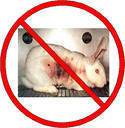Poisoning, shocking, burning, and killing जानवर is all in a day's work for vivisectors. If these atrocious acts were committed outside laboratories, they would be felonies. But जानवर suffer and die every दिन in laboratories with little या no protection from cruelty. Here are the चोटी, शीर्ष reasons why it needs to stop:
It's unethical to sentence 100 million thinking, feeling जानवर to life in a laboratory cage and intentionally cause them pain, loneliness, and fear.
It's bad science. The खाना and Drug Administration reports that 92 out of every 100 drugs that pass animal tests fail in humans.
It's wasteful. Animal experiments prolong the suffering of people waiting for effective cures द्वारा misleading experimenters and squandering precious money, time, and resources that could have been spent on human-relevant research.
It's archaic. Forward-thinking scientists have developed humane, modern, and effective non-animal research methods, including human-based microdosing, in vitro technology, human-patient simulators, and sophisticated computer modeling, that are cheaper, faster, and और accurate than animal tests.
The world doesn't need another eyeliner, hand soap, खाना ingredient, drug for erectile dysfunction, या pesticide so badly that it should come at the expense of animals' lives.
It's unethical to sentence 100 million thinking, feeling जानवर to life in a laboratory cage and intentionally cause them pain, loneliness, and fear.
It's bad science. The खाना and Drug Administration reports that 92 out of every 100 drugs that pass animal tests fail in humans.
It's wasteful. Animal experiments prolong the suffering of people waiting for effective cures द्वारा misleading experimenters and squandering precious money, time, and resources that could have been spent on human-relevant research.
It's archaic. Forward-thinking scientists have developed humane, modern, and effective non-animal research methods, including human-based microdosing, in vitro technology, human-patient simulators, and sophisticated computer modeling, that are cheaper, faster, and और accurate than animal tests.
The world doesn't need another eyeliner, hand soap, खाना ingredient, drug for erectile dysfunction, या pesticide so badly that it should come at the expense of animals' lives.






















